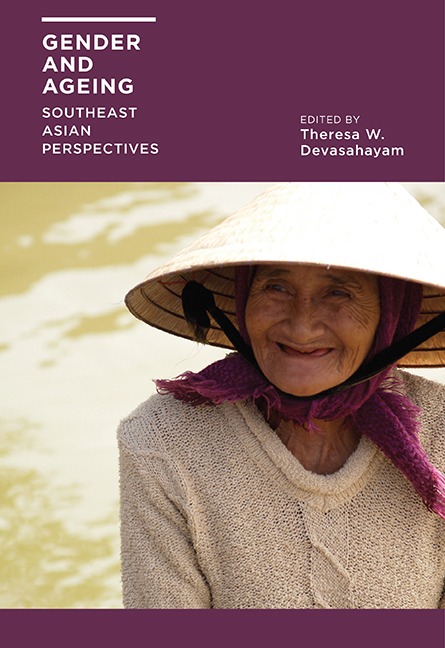Book contents
- Frontmatter
- Contents
- List of Tables and Figures
- Acknowledgments
- Contributors
- 1 Growing Old in Southeast Asia: What Do We Know about Gender?
- 2 Gender and Ageing in Thailand: A Situation Analysis of Older Women and Men
- 3 Gender and Well-being of Older Persons in Cambodia
- 4 Preparations for Old Age and Social Participation of Present and Future Older Persons in Thailand: Gender Difference
- 5 Gender and Health Status among Older Adults in Vietnam
- 6 Ageing and Gender Preferences in Rural Indonesia
- 7 Exploring the Experiences of Older Men and Women in Caregiving and Care-receiving in Sarawak, Malaysia
- 8 An “Active Ageing” Approach to Living Alone: Older Men and Women Living in Rental Flats in Singapore
- 9 Ethnic Patterns and Styles of Active Ageing among Widows and Widowers in Singapore
- 10 Employment Patterns of Older Women in Indonesia
- 11 Gender Differentials in Work and Income among Older Malaysians
- 12 Gender and Economic Well-being among Older Filipinos
- 13 Work, Retirement and the Gender Divide in the Philippines
- Index
12 - Gender and Economic Well-being among Older Filipinos
Published online by Cambridge University Press: 21 October 2015
- Frontmatter
- Contents
- List of Tables and Figures
- Acknowledgments
- Contributors
- 1 Growing Old in Southeast Asia: What Do We Know about Gender?
- 2 Gender and Ageing in Thailand: A Situation Analysis of Older Women and Men
- 3 Gender and Well-being of Older Persons in Cambodia
- 4 Preparations for Old Age and Social Participation of Present and Future Older Persons in Thailand: Gender Difference
- 5 Gender and Health Status among Older Adults in Vietnam
- 6 Ageing and Gender Preferences in Rural Indonesia
- 7 Exploring the Experiences of Older Men and Women in Caregiving and Care-receiving in Sarawak, Malaysia
- 8 An “Active Ageing” Approach to Living Alone: Older Men and Women Living in Rental Flats in Singapore
- 9 Ethnic Patterns and Styles of Active Ageing among Widows and Widowers in Singapore
- 10 Employment Patterns of Older Women in Indonesia
- 11 Gender Differentials in Work and Income among Older Malaysians
- 12 Gender and Economic Well-being among Older Filipinos
- 13 Work, Retirement and the Gender Divide in the Philippines
- Index
Summary
INTRODUCTION
Older women are often perceived as more vulnerable to social, economic, and health disadvantages. It is often surmised that gender discrimination is the main cause for the disadvantages they face. In situations where social structures reinforce such gender biases, particularly in education and employment opportunities, the cumulative effect of earlier life experiences render older women generally poorer than men. There are those who argue that the perceived disadvantaged position of older women may be an oversimplified global generalization which ignores the substantial variations in the relative situations of older men and women (Ofstedal, Reidy, and Knodel 2004; Knodel and Ofstedal 2003). In the Philippines, for example, the legal framework affirms equality for all citizens regardless of gender, which has helped ensure a relatively high degree of protection of its women. This is not to say that gender equality has been fully achieved, given the discrimination against women that continues to prevail in some sectors in the Philippines. It is thus important to understand the gender situation, particularly on the economic front among the older cohort, most of whom come from the generations that preceded the enactment of policies and programmes that have protected the rights and privileges of women in the country.
This chapter aims to provide an empirical analysis of the economic well-being of older Filipinos highlighting differences across gender and marital status groups. It explores the levels and differentials in economic status of older people using various objective and subjective indicators of economic well-being. The extent to which subjective and objective indicators of economic well-being interrelate with each other is likewise examined so as to generate a more appropriate measure for assessing the economic well-being of older Filipinos. This analysis is of importance in a low-income country such as the Philippines where a third of the country's population is currently living in poverty (UN OCHA, n.d.), with the older sector expected to be more vulnerable to economic liabilities.
- Type
- Chapter
- Information
- Gender and AgeingSoutheast Asian Perspectives, pp. 288 - 314Publisher: ISEAS–Yusof Ishak InstitutePrint publication year: 2014

